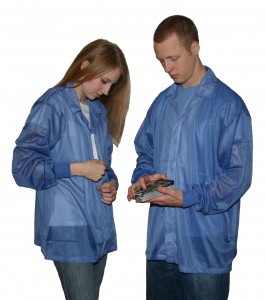ESD Garments and Static Control

ESD jackets, also commonly known as ESD smocks, ESD lab coats or ESD garments, offer protection from electrostatic fields generated by clothing on the user’s body. ESD jackets are worn where ever static damage is a concern. ESD jackets are designed to be antistatic and low tribocharging because they constructed out of polyester or cotton (or a blend of both) impregnated with a grid of woven conductive fibers. The grid creates a “Faraday Cage” effect around the body of the operator that shields charges generated from the operators clothing from damaging ESD sensitive devices.
ESD Jackets as part of a complete ESD program.
ESD jackets are the most visible sign of ESD protection and facilities that mandate ESD garments demonstrates a commitment ESD protection. ESD jackets are a recommended addition to a program that already includes typical grounding measures, such as wrist straps and heel grounders. This is because of the potential hazard of the operator’s clothing. The ESD TR20.20-2008 states: “While a person may be grounded using a wrist strap or other grounding methods, that does not mean that insulative clothing fabrics can dissipate a charge to that person’s skin and then to ground. Personnel clothing usually is electrically separate or isolated from the body.â€Â
Groundable Static Control Garments Systems
ESD jackets can also be used to ground personal. If the fabric of the jacket is conductive enough, a person can be grounded through a jacket if it is connected to ground with a coil cord. This is called a “Groundable Static Control Garment Systemâ€Â. This jackets must “provide a resistance of less than 35 megohms from the person to the groundable point of the garment.â€Â[ESD TR20.20-2008 section 5.3.13 Garments]
Styles of ESD Garments
ESD Garments come in many shapes and sizes. Typical distinctions are collar type, fabric composition, sleeve terminations and lengths. Collar options typically include lapel, v-neck or military style. Sleeve terminations are either a three snap cuff that adjusts for a proper fit or an ESD cuff that allows for hands free grounding. There are three lengths of jackets, waist length, 3/4ths and full length. Fabrics composition will vary by manufacture but are typically a polyester fabric or a cotton polyester blend with carbon. Your choice of fabric will be determined by operator comfort and ESD performance. You may choose a lightweight polyester for warmer climates or a cotton polyester blend for cooler climates.
Cleaning of ESD lab coats
The proper method to clean a lab coat is to wash the garment in cool or warm water, tumble dry with low heat or hang dry. Do not bleach your ESD lab coats! Make sure you only use non-ionic softeners and detergents when laundering.
